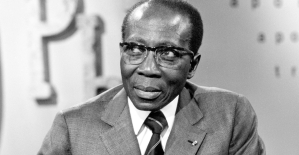"We are the last generation before the tipping points!" posters the "Last Generation" - tipping points have become the most important argument for climate activists. Supposedly, these are thresholds in the climate system that bring about irrevocable and catastrophic changes.
The concern is fueled by a small circle of scientists, including those from the Potsdam Institute for Climate Impact Research (PIK), who wrote the fundamental papers on the subject. But knowing about tipping points is like a mirage: the closer you look at them, the less of them remains.
It has proved problematic to include robust warnings about tipping points in the scientific literature. The fact that it was nevertheless successful reveals how politics is made with science.
At the World Economic Forum in Davos in January, PIK Director Johan Rockström warned of 16 tipping points, nine showing "signs of instability," Rockström warned. They threatened to "undermine humanity."
The UN Climate Change Council, which summarizes knowledge about climate change, had previously documented a very different judgment on tipping points. The phenomena "cannot be ruled out", but there is "insufficient evidence", a "lack of data", the topic is "challenging".
Leading colleagues from climate research are also much more cautious about tipping point risks than Rockström and his colleagues from PIK. The knowledge about the phenomena is as full of holes as thawing permafrost. Nevertheless, the PIK researchers have managed to smuggle urgent warnings of tipping points into the scientific literature.
The publication on the tipping points, which is still fundamental today, came from a group led by Rockström and his predecessor, the founding director of PIK, Hans Joachim Schellnhuber. In 2008, together with their PIK colleague Stefan Rahmstorf, the British climatologist Timothy Lenton and others, they published a survey with answers from 52 climate researchers, which quickly became one of the most cited works in climate research. Thousands of studies refer to it, it is by far the most influential paper on the subject.
With that publication from 2008, the term “tipping point” made a name for itself, mass media reported worldwide, and meanwhile 63 Wikipedia articles link to the article. The Wikipedia article on tipping points itself reads almost like a copy of the PIK paper. The problem: it did not meet the standards of a scientific study.
The survey by the PIK researchers was published in the scientific journal "Proceedings of the National Academy of Sciences" (PNAS), the magazine of the US National Academy of Sciences (NAS). However, it was not a peer-reviewed study, but an "introductory article" that newly elected NAS members are allowed to submit "to introduce themselves to the readers of PNAS". Schellnhuber was admitted to the NAS in 2005, and the tipping point survey was his first PNAS publication.
PNAS published the tipping point post as a "Perspective". Unlike studies, "Perspectives" meet weak criteria: According to PNAS, such texts need only "identify a critical scientific problem, provide a state-of-the-art assessment and offer new insights or a new approach to its solution".
An interesting overview of a relevant research topic is sufficient. Whether there is scientifically substantial evidence for the phenomena presented is irrelevant for a "Perspective". This is how the tipping point warning got into a renowned science magazine.
Surveys would be problematic, the authors themselves admitted. It would be criticized that they do not contribute to the stock of scientific knowledge, but only reproduce prejudices. Surveys have proven to be a “valuable source of information for shaping public policy”. Schellnhuber speaks of the "gut feeling of science".
The term “tipping points” changed the climate debate: it is used to “solve a political problem by restructuring public perception in new and substantive ways,” commented Chris Russill of Carleton University and Zoe Nyssa of the University of Chicago in 2009 in the journal Global Environmental Change.
A year after their survey, Schellnhuber and colleagues published again about tipping points in "PNAS", this time a survey of 43 climate researchers. This time, the experts accepted it as the correct study, although little was left of the alarming style of the previous article: "Inaccurate probability assessment of tipping points in the climate system," the work was called.
The text revealed that it seemed too early for tipping point alerts: "Although the expert estimates highlight a great deal of uncertainty, they assign a significant probability to some of the events listed above," Schellnhuber and his colleagues wrote, unusually reticent. The work fell short compared to the previous one, it received only a fraction of the citations.
When Rockström, Schellnhuber and colleagues wanted to bring the tipping points back into the debate with urgency in 2018, they again played it safe and chose a PNAS “perspective” without harsh evaluation. The article was published by "PNAS" unusually quickly: just 17 days after it was received by the editorial team. Studies can take months or even years to be published.
The unusually hot summer of 2018 in Europe and the US probably helped place the essay warning of a “hot season”, “Hothouse Earth” from which there is no turning back. The authors did not bring any new insights; these were the well-known speculations about the alleged tipping points that could "prevent climate stabilization".
The "Perspective" unfolded enormous force, the media response was huge. According to one analysis, the essay was the "most influential climate publication of 2018", and "Heisszeit" was voted "Word of the Year" by the Society for German Language.
Renowned climate researchers expressed doubts when they were asked about it at all: tipping points are “conceivable, we cannot rule them out, but we actually know little,” said Jochem Marotzke, Director of the Max Planck Institute for Meteorology, around 2020. But the PIK researchers were undeterred.
In "Nature" they published a comment at the end of 2019, shortly before the UN climate conference in Madrid: "Climate tipping points - too risky to bet against". "The growing danger of abrupt and irreversible climate change," the text said, "must force political and economic action."
The climate researcher Justin Ritchie, who was not involved in the essay, was irritated by the conspicuously frequent use of the word "if" in the text; the word "might" even occurred 25 times: "If it takes eleven times 'if' to support an opinion, then check the substance," he wrote. "After reading this, I'm less convinced of upcoming tipping points."
Six months after publication, the “Nature” comment had to be corrected to an unusual extent: readers discovered five errors in the central image of the article. They weren't noticed with "Nature" - the text could have been published as a comment without review.
But the authors did not give up. A group led by Rockström and Schellnhuber again published a dramatic warning of tipping points in 2022: "Climate Endgame - Research into catastrophic climate change scenarios" was the title of another "Perspective" in PNAS. The theses: The world would be on the way to an extreme scenario, extreme scenarios would be neglected, their emphasis could accelerate action on climate protection.
So far, fellow climate researchers had turned up their noses at all the dazzling tipping point publications, but mostly remained silent in public. But the “Climate Endgame” provoked criticism.
"In my opinion, there is little evidence that climate change is worse than we thought, nor that assessments downplay the risks, or that we are doomed," said ETH Zurich climatologist Reto Knutti. The article does not reflect “mainstream thinking on the subject of climate”.
It is "not the first such PNAS perspective by the same authors," emphasized Knutti. Although those publications are "interesting to read", they are opinion pieces, not new science. "I appreciate the authors and their work," Knutti explained, but such articles would "predictably distort and confuse without providing new insights."
The environmental researcher Roger Pielke Junior from the University of Boulder also contradicted the theses of the PIK researchers: He pointed out that unrealistic extreme scenarios are used most frequently of all scenarios in the UN climate report. Current estimates also show much lower warming than claimed in the Climate Endgame article.
But the tipping point group around Rockström and Schellnhuber was already working on the next releases. In autumn 2022, Rockström and colleagues were able to publish a tipping point study in “Science”, according to which tipping points could already threaten warming above 1.5 degrees. Media around the world reported.
Schellnhuber, who was not involved in the article this time, was allowed to contribute a short foreword: "The analysis shows that even global warming of 1 °C, a threshold that we have already exceeded, puts us in danger by affecting some tipping points triggered,” wrote Schellnhuber.
As usual, the criticism did not make the headlines: the “Science” essay should be read with caution, commented the climate researcher Philippe Huybrechts from the Vrije Universiteit Brussel. The review article in "Science" is politically colored; Reports by the UN Climate Council are more cautious - for good reason: "We don't want to revise our statements in five years," Huybrechts told the "NZZ".
The climatologist Thomas Stocker from the University of Bern, chairman of the fifth UN climate report, also warned of caution in view of the study: "I am of the opinion that it cannot yet be said with certainty, the current state of research does not allow it," he told Die Zeit. Climate science "still knows too little about tipping points, both in terms of theory and models and observations," explained Stocker.
He complained about "a bias in the reporting", i.e. a distortion: tipping points attracted a lot of attention because they were "descriptive and dramatic". "But in my opinion, this is risky for the credibility of science, because we are still discussing on the basis of relatively little evidence," warned Stocker.
The beneficiaries of the tipping points leave the ignorance cold. The United Nations, for which global problems such as climate change are status-enhancing, gratefully took up Rockström's "Science" study. In September 2022, the UN warned: "When the world reaches a tipping point, we will face irreversible changes."
Shortly thereafter, the Green Party politician Kathrin Henneberger tweeted about the climate protests in the coal mining area in Lützerath: “Globally we are about to exceed the climate tipping points. In the meantime, people are digging here as if none of this were real, as if there were no climate crisis.”
PIK researcher Stefan Rahmstorf uses his tipping point attachments for his own products: "We are about to cross dangerous tipping points," he tweeted at the end of September 2022. "The irreversible changes this will trigger will also be devastating for us in Germany and can affect entire societies destabilize,” wrote Rahmstorf. He also advertised a new book he was involved in: "3 degrees more - A look into the impending hot period".
In mid-February, an international research team released the tipping point hysteria: "Most tipping elements do not have the potential for abrupt future changes within years," summed up the experts in the journal "Reviews of Geophysics". Some might not even be tipping points, but warming could alter the phenomena in "serious ways."
Climate researcher Stocker warns against exaggerations: In a debate, he once took the position "that we don't yet know enough about tipping elements", but the mood was so heated that he couldn't have had a say, the climate researcher said.
Even "violent resistance" was propagated in the debate. Nobody objected, said Stocker. "I found that very scary."
Editor's recommendation: Also follow Axel Bojanowski's blog on climate change. Latest post: Critical distance: Habeck's climate ministry does not need a press office, it has the "Spiegel"

 Sudan ravaged by a year of war
Sudan ravaged by a year of war Ten years after the kidnapping of the Chibok girls, what has become of the terrorist group Boko Haram?
Ten years after the kidnapping of the Chibok girls, what has become of the terrorist group Boko Haram? The Israeli government divided on the extent of its response after Iran's direct attack on its territory
The Israeli government divided on the extent of its response after Iran's direct attack on its territory “Is it time for a killing blow?” : the Israeli press wonders about a response after the Iranian attack
“Is it time for a killing blow?” : the Israeli press wonders about a response after the Iranian attack Covid-19: everything you need to know about the new vaccination campaign which is starting
Covid-19: everything you need to know about the new vaccination campaign which is starting The best laptops of the moment boast artificial intelligence
The best laptops of the moment boast artificial intelligence Amazon invests 700 million in robotizing its warehouses in Europe
Amazon invests 700 million in robotizing its warehouses in Europe Inflation rises to 3.2% in March due to gasoline and electricity bills
Inflation rises to 3.2% in March due to gasoline and electricity bills Large French companies are alarmed by the stalling of the European economy
Large French companies are alarmed by the stalling of the European economy New sanctions against Russia send industrial metal prices soaring
New sanctions against Russia send industrial metal prices soaring Olympic Games 2024: civil servants authorized to carry out private security activities
Olympic Games 2024: civil servants authorized to carry out private security activities Threat of strikes for the 2024 Olympics: Macron says he has “confidence” in the “spirit of responsibility” of the unions
Threat of strikes for the 2024 Olympics: Macron says he has “confidence” in the “spirit of responsibility” of the unions Musical show: “Come Bach”, fantasies around the composer
Musical show: “Come Bach”, fantasies around the composer The cry of alarm from Senghor's friends has been heard
The cry of alarm from Senghor's friends has been heard World Chess Championship: Nepomniachtchi and Gukesh lead the candidates tournament
World Chess Championship: Nepomniachtchi and Gukesh lead the candidates tournament Rapper Heuss L’Enfoiré calls on Ronaldinho for his new music video
Rapper Heuss L’Enfoiré calls on Ronaldinho for his new music video Skoda Kodiaq 2024: a 'beast' plug-in hybrid SUV
Skoda Kodiaq 2024: a 'beast' plug-in hybrid SUV Tesla launches a new Model Y with 600 km of autonomy at a "more accessible price"
Tesla launches a new Model Y with 600 km of autonomy at a "more accessible price" The 10 best-selling cars in March 2024 in Spain: sales fall due to Easter
The 10 best-selling cars in March 2024 in Spain: sales fall due to Easter A private jet company buys more than 100 flying cars
A private jet company buys more than 100 flying cars This is how housing prices have changed in Spain in the last decade
This is how housing prices have changed in Spain in the last decade The home mortgage firm drops 10% in January and interest soars to 3.46%
The home mortgage firm drops 10% in January and interest soars to 3.46% The jewel of the Rocío de Nagüeles urbanization: a dream villa in Marbella
The jewel of the Rocío de Nagüeles urbanization: a dream villa in Marbella Rental prices grow by 7.3% in February: where does it go up and where does it go down?
Rental prices grow by 7.3% in February: where does it go up and where does it go down? Europeans: the schedule of debates to follow between now and June 9
Europeans: the schedule of debates to follow between now and June 9 Europeans: “In France, there is a left and there is a right,” assures Bellamy
Europeans: “In France, there is a left and there is a right,” assures Bellamy During the night of the economy, the right points out the budgetary flaws of the macronie
During the night of the economy, the right points out the budgetary flaws of the macronie Europeans: Glucksmann denounces “Emmanuel Macron’s failure” in the face of Bardella’s success
Europeans: Glucksmann denounces “Emmanuel Macron’s failure” in the face of Bardella’s success These French cities that will boycott the World Cup in Qatar
These French cities that will boycott the World Cup in Qatar Augusta Masters: the unchallenged reign of Scottie Scheffler
Augusta Masters: the unchallenged reign of Scottie Scheffler Tennis: Harold Mayot takes Cachin and goes to the second round in Barcelona
Tennis: Harold Mayot takes Cachin and goes to the second round in Barcelona Barça-PSG: “We will do it”, Luis Enrique shows his confidence before the return match
Barça-PSG: “We will do it”, Luis Enrique shows his confidence before the return match Hakimi on Mbappé before Barça-PSG: “I feel very good, very motivated, like the whole team”
Hakimi on Mbappé before Barça-PSG: “I feel very good, very motivated, like the whole team”


















